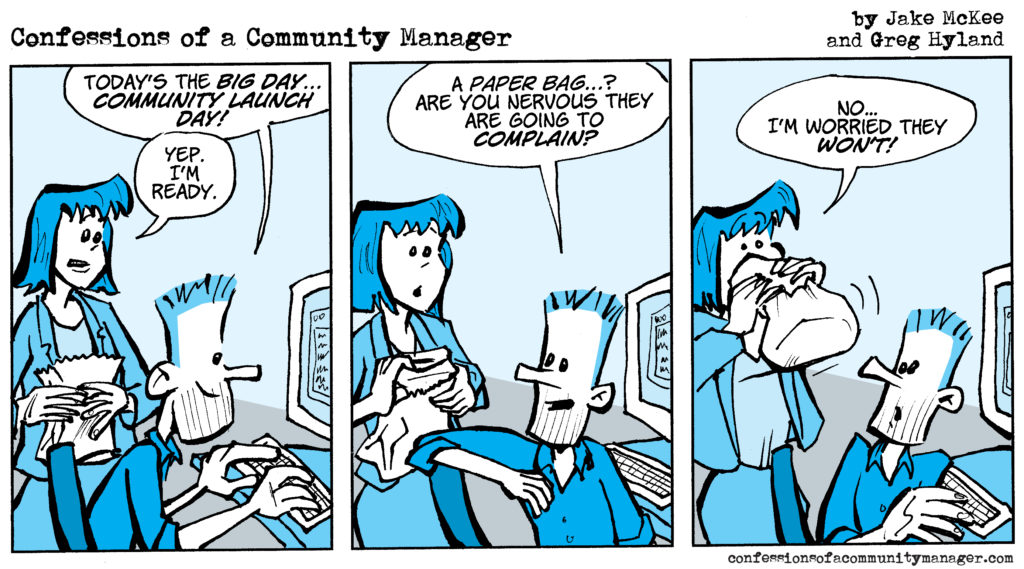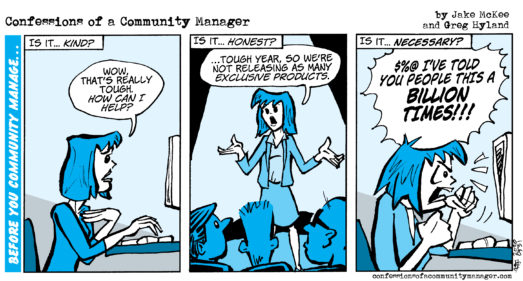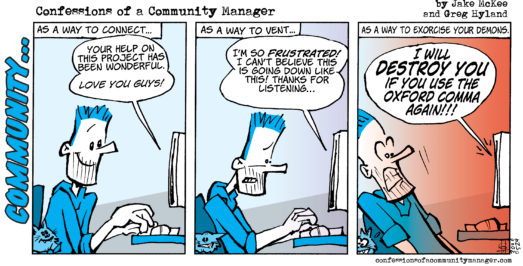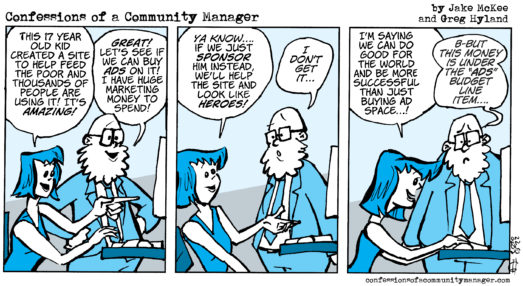Launch Day
Over the years, I’ve launched a lot of Web sites. At last rough count, it’s about 425+, from large scale marketing sites to smaller microsites to purpose built short term community sites to robust long term community projects and more.
Launch Day is always a paper bag moment no matter what type of site. It’s always nerve wracking. Every single site has a range of issues leading up to launch. “We’ll launch at 2p!” you say the day before when everything looks perfect and ready to go. And without fail, there’s one last approval or one last copy tweak or one last second guessing of a navigation item. Something that turns 2p into 5p. Just enough to create dramatic tension when you finally push the metaphorical red button to launch the site live.
Then….
You wait…
And for an uncomfortably long period, nobody says or does ….anything.
Silence.
It’s terrifying.
Launch Day for a communities is a more bizarre experience when compared to a traditional site.
My hope and advice is that launch is never cold (i.e. launching to the broad world with zero members and zero content). The goal is typically to build a small collection of early testers/adopters and seed some early release content so the site feels “alive” from day one. But still, when you release the community and invite folks in on that first day, it can feel like the first minutes of a high school party where the refreshments are out, the music is playing, but the guests haven’t started to arrive yet. Are they ever going to arrive? Is this party going to be a disaster? Will I be known as the uncool kid at school forevermore??
And then people start to show up, and given that this is the internet… the complaints start to roll in. If you’ve been doing this as long as I have, there’s a certain amount of joy in hearing these complaints. You’d think it’d be deflating. WHY ARE THESE PEOPLE CALLING MY BABY UGLY?? The team has been working for weeks, if not months (and sometimes years) to get this damn community launched and here comes the masses complaining about every little thing. It can be heartbreaking. Needle: meet balloon. POP!
But the reality is that in the world of the internet, engagement and passion that lead to feedback like this is a good thing. Especially early on as the member is joining the community, especially in the early days of the community launching. It’s a signal that this place is worth it. It’s worth investing in. It’s worth the member sharing feedback with you because they believe it will be taken seriously. It’s worth sticking around to see how their feedback turns out.
And this is a message that’s critically important to communicate to our colleagues before, during, and after launch. Otherwise you’ll get a lot of scared and/or skeptical feedback about why the members hate the community and whether the investment was worth it or not.
There are three Launch Day Rules to consider as you lead up to that big day:
Launch Day starts before Launch Day
Launch Day is a big day, but hopefully it’s more ceremonial than truly significant. Build a team of community leaders and members who have advised you all along the development path. Choose a couple members at the outset when you first thing “should we build a community?” and ask them for their feedback. Build a roundtable of members who can review near final design ideas and provide feedback when there’s still time to make changes. Hand select an Alpha testing group and invite them in under NDA in secret. Announce a beta testing program and solicit volunteers via community submissions. Share this journey with the community and with your customer base along the way (if it makes sense in your marketing/community journey).
Launch Day Platform is version 0.5 not 1.0
Design, budget, plan, launch, and gain executive buy-in for the reality that your Launch Day platform will be closer to a version 0.5 than a 1.0. This doesn’t mean that you will have a “bad” product on Launch Day, it simply means that you’ve built a product and product roadmap that knowingly and properly assumes that changes will need to be made once real users put the platform to work at scale under real conditions.
The mistake so many teams make is taking 100% of their budgets and spending them on getting to Launch Day. Then the community launches, members spend the first couple weeks getting acclimated and asking for small and large changes to make the experience better aligned for success, but there’s no budget left to make those changes.
Build yourself some padding to see what users are going to want. No matter how well you plan in advance, you never know what will happen when real users get ahold of your community.
The work really starts, not stops on Launch Day
Just like the technical platform needs to have some reserve funding held back, so too does your human platforms… aka Community Management. We all work really hard to get the technology, logistics, and content ready to go and late into the night to prep for Launch Day. Then Launch Day arrives and we’re exhausted. But now it’s time to manage the members that come rolling into the community.
It’d be like opening a retail store and working all night for a week to get the physical space ready for our grand opening event… then falling asleep at the cash register or snapping at customers when they come up to pay for the goods.
I often recommend that you target finishing the platform tech dev by Friday at 5p then taking the weekend off and launching Monday morning first thing. This is a forcing function to get some rest over the weekend and to mentally transition from Tech Lead to Community Manager.
It’s important to remember that launching an online community isn’t like launching a traditional Web site. Yes, it’s tech with content issues and DNS issues and QA issues and all the other trappings of launching Web properties. But we’re launching an experience when we launch a community. One that will connect people in ways that has power beyond what we the Community Professional may ever imagine. These experiences may lead to joy, tears, fear, sadness, power, connections, and so much more. These experiences may help make our jobs easier, may make our cancer treatments a little more comfortable and less lonely, or may help us find and enjoy a hobby that we didn’t know had such depth and fun.
We are creating mini-families.
And as frustrating as it can be, families tell it to you straight.



